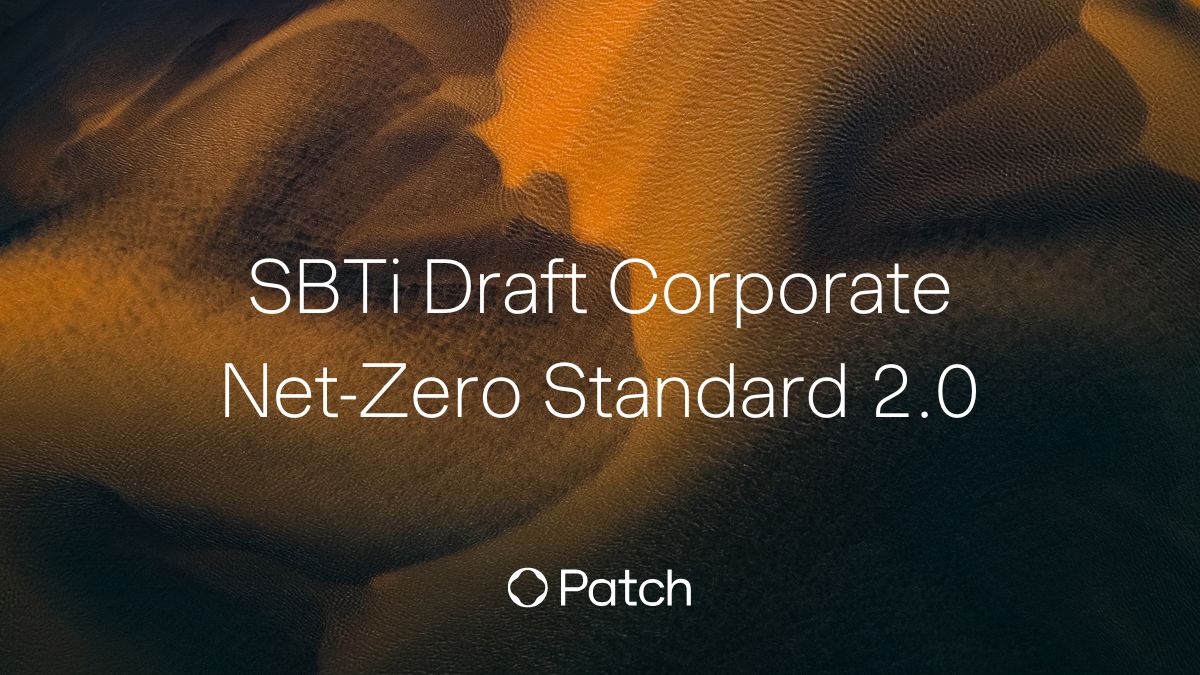Today, Patch published an open letter calling on the Science Based Targets Initiative (SBTi) to provide swift and decisive guidance for companies to use high-integrity carbon credits for Scope 3 abatement.
From the frontlines of supporting companies in the implementation of their climate strategies, Patch has seen first hand the adverse impacts this lack of guidance is creating, sidelining critical funding for climate solutions across the globe. The risk to our planet is too great to stay silent.
The open letter is pasted below and my corresponding comment linked here.
Dear Science Based Targets Initiative (SBTi),
I’m writing on behalf of Patch, a leading carbon credit platform at the forefront of the voluntary carbon market (VCM), whose mission is to channel capital into critical climate solutions.
Patch helps companies develop and implement effective carbon credit strategies as part of their broader climate action plans. This gives us a clear view of the opportunities and challenges of deploying corporate climate finance to carbon removal and avoidance projects. Our interactions with over 500 corporate customers across the globe has made it clear that the uncertainty surrounding whether carbon credits can be used to address Scope 3 emissions as part of SBTi-validated targets is preventing companies from channeling finance to these essential climate solutions.
We understand that SBTi plans to release a discussion paper on this topic in July 2024. However, SBTi has also indicated that the final revised corporate net-zero standard, which will provide companies with clear guidance on how carbon credits can be used to help address emissions a company indirectly affects within its value chain (known as Scope 3 emissions), will not be completed until Q4 of 2025. This timeline is too long.
The planet cannot wait. We are deeply concerned about the negative climate impact of waiting another 18 months for decisive guidance on the use of high-integrity carbon credits for Scope 3 abatement.
Patch is therefore calling for accelerated guidance from SBTi on using high-integrity carbon credits for Scope 3 emissions abatement by Q4 of 2024 at the latest.
Since 2015, SBTi has played a leading role in bringing scientific rigor and scrutiny to corporate climate action, helping the private sector develop robust strategies for reducing their emissions. Just as the urgency with which we need to tackle the climate crisis has increased over the last decade, so too has the role the voluntary carbon market can play in these efforts. Now, by leveraging the work already done by the broader community, SBTi has every tool required to act rapidly on updating its guidance, while still maintaining the scientific rigor of the initiative.
Scores of academic experts and third-party standards organizations have united around defining and implementing high-integrity carbon credit markets, including The Oxford Offsetting Principles, The Integrity Council for the Voluntary Carbon Markets’ Core Carbon Principles, and VCMI Claims Code of Practice. The G7 and the U.S. federal government have also shown clear support for corporate use of high-integrity carbon credits and the U.S. has called for immediate resolution to questions around the use of credits to address Scope 3 emissions.
Independent studies conducted in the last 12 months also demonstrate that corporate use of high-integrity carbon credits are consistently correlated with greater climate ambition and action overall. A recent report found carbon credit buyers spend three times more on emissions reductions and are 1.3 times more likely to have supplier engagement strategies than companies who are not participating in the voluntary carbon market. Another report found that 71% of corporate leaders agreed that participation in the voluntary carbon market allows their company to take additional climate action, which otherwise wouldn’t happen without purchasing carbon credits.
Having co-founded and led a rapidly scaling company over the last four years, I can empathize with the challenges organizations face in building and delivering new products while managing complex stakeholder relationships and external pressure. But climate action is a team sport. Patch is ready and willing to support SBTi in accelerating their work with frontline evidence on corporate behavior and barriers to action, while leveraging rigorous and technology-driven tracking of carbon credit purchases to facilitate market transparency.
Again, SBTi must act swiftly and release clear guidance defining how corporations should leverage high-integrity carbon credits to deploy rapid climate finance, or risk a legacy of delaying climate action for the planet.
Sincerely,
Brennan Spellacy
Patch CEO & Co-founder






